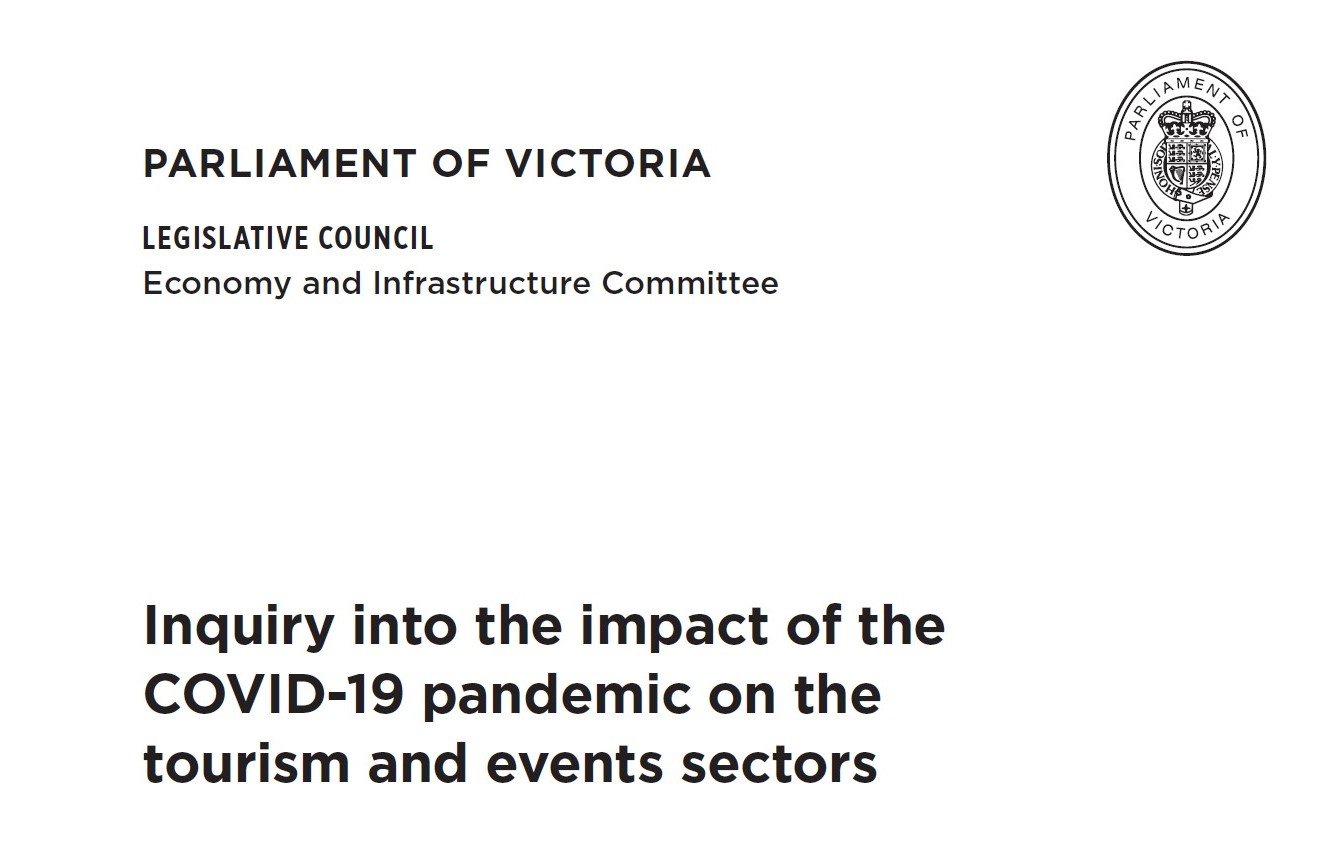News
18 Aug 2021
When government reports make the reading list

Subscribe to CX E-News
One Tuesday in early August 2021, I received several messages about the release of the following Victorian report: “Inquiry into the impact of the COVID 19 pandemic on the tourism and events sectors.” I’ve just finished trawling through 300+ pages and it makes for very grim reading … on oh so many fronts.
Government reports are rarely lightweight (unless purposely so for political expedience) and even more rarely on my must-read list. But this one was different. Having made a submission myself, I was keen to see what the pollies / bureaucrats had cooked up.
The overarching narrative was that government and public service previously had very little understanding of the events industry. Their grasp still seems slim but at least they now know that we exist.
Findings & musings
There was much to wade through and even more to consider. After glossing over the tourism related content, several event related items stood out to me. I’ve condensed the most prescient bits of bureaucratic word salad that are relevant to my understanding of the event industry. Here are the key ones.
“FINDING 11: Events provide economic, social and cultural value to Victoria.” Well, no shit Sherlock. Who woulda thunk? Why has it taken a parliamentary enquiry to work out this nugget? This correlates with FINDINGS 21 & 22, which I’ll paraphrase as “government didn’t understand the event industry and didn’t consult well developing the Public Events Framework”.
“FINDING 15: The inability to insure against COVID 19 is a large barrier to the recovery of the events sector in Victoria.”
This I see as one of the greatest impediments to resumption of successful events. Gigs always have an element of risk; we’ve long known that. When that risk outweighs any potential returns, promoters won’t commit.
“FINDING 16: The loss of skilled workers is another threat to the recovery of the events sector in Victoria.”
And this one is my greatest fear. I know so many talented individuals with incredible world’s best technical and stagecraft knowledge that have already walked away from the industry or are seriously considering it. And that’s just my small sample set. I’m not sure how to best to retain or pass that knowledge on.
“FINDING 26: A single peak industry body for Victoria’s whole events sector would simplify consultation with the Victorian Government.”
Now to my greatest hope – that we can find some common ground and organise for our own good. I know efforts have been made in the past but what better time to try than now?
The above are what clear headed factual analysis gleaned. The next finding just plain annoyed me. Like many, I unwind watching elite athletes strut their stuff, but I bemoan the double standards that allow sporting events to continue while all other events are knobbled.
“FINDING 20: Some event organisers feel that major events, particularly professional sport, are treated more favourably regarding restrictions and density limits.” Oh, if only theatre, concerts, conferences, trade shows, circuses and the like were held in such esteem in the notional national psyche as the chasers of a ball.
Further impressions
Aside from the tedious polly waffle, this report highlights three critical issues:
1. Insurance underwriting is required at a government level to ensure some degree of certainty for event organisers, workers and attendees. This can be state, federal or both.
2. We, the events industry, need to group together to provide a focal point for government interaction and advocacy.
3. Regrowing the industry will take time. Retaining skills during this period will be difficult.
Let’s break them down further…
Insurance backing
To give any degree of certainty to those planning events, it is clear that insurance underwriting for Covid cancellation is essential. This has at least been recognised at a Victorian level and some tentative steps are being taken. But it really needs a national approach. Unfortunately, the federal minister for (ignoring) the arts has washed his hands of this and us again, deferring any responsibility back to the states. Now, there’s leadership! How good is that?
Instead, let’s look to the example of the UK, Germany, Austria, Netherlands, Belgium, Norway, Denmark, and Estonia who have just brokered a deal with Lloyds to underwrite lockdown cancellation insurance for the live music and entertainment sectors in their regions. Obviously, these domains have better regard for, and understanding of, their creative industries than ours seems to.
Getting the industry together – The events advocate
Here’s the next tough bit – what exactly does define the ‘events industry’ and how do we lobby together?
While digesting this report, I’ve talked to many event veterans, each with decades of experience. Several have only ever done music concerts, some only business conferences, another only regional ag shows. They are all high-level professionals but have never crossed paths. Above all, each is very skilled at ‘putting on events’.
There is another elephant in the room – a common theme of proud individualism across many of these sectors. In part, it’s a good reason why I have been drawn to them. In good times, this has been an asset. In darker moments like now, it works against us.
So, collective action? First, define the groups affected: conference, trade show, concert, theatre, musical, circus, ag show, art show, festival, comedy, outdoor adventure, sport and any other grouping that assembles people for profit. Next, identify and corral the individual associations of each sub-sector to form an uber-body.
Workers – join the MEAA. Companies – lobby your niche association to join a broader collective and form a peak body. I don’t know enough about the machinations of existing organisations but can see benefits in allying the following:
Live Performance Australia, Live Entertainment Industry Forum, Aria, ALIA, Australian Festivals Association, Outdoor Council of Australia, Agricultural Shows of Australia, Theatre Network Australia, and more that I may have missed. The big one to bring on board would be the Business Events Council of Australia, representing a large fiscal chunk of event work.
All these sectors employ audio, lighting, video and staging techs. All use production managers, runners, safety and site crew. All engage labour hire, production or supply companies. All with confusing ASIC numbers that don’t relate to their actual job functions.
Finally, a national approach is required. The Save Victorian Events team have done an outstanding job in getting the matter both tabled and investigated. This report was Victorian based, but the problems and lessons are country wide. Many shows tour across state borders. Current inconsistencies between the colonies and sudden gate-locking have only made the task harder.
I’d love to see a national events body that can lobby more coherently and consistently for a sector that provides innumerable financial and cultural benefits to our greater society and economy.
Skills retention
Many have left, and many for good, so how do we keep those that are left? One good friend is watching 30 years of their business go down the toilet with their life savings. I know of several production companies that sold their entire inventory at a loss and walked away. Another old friend is hanging up the shingle after 35 years and has no idea what is next. Many of you will know more horror stories than that. Many will be the subject matter of them.
The talent drain over the last 18 months is immeasurable. Natural attrition over time is normal but this trend is gravely accelerated in recent months. How do we keep the skills alive and passed on to the next generation?
I know of those who have found related gigs in film and TV. Maybe they’ll come back in time. This report suggests some TAFE courses and apprenticeships. These might help over a longer period, but I fail to see who will be teaching them, beyond the generation that just had their careers wiped. Perhaps instruction might be a career path for those in this boat.
Some government initiatives have commenced. As I write, Support Act has received $20m in funding. While this is awesome, it is but a very small Band-Aid over a gaping, bleeding wound. If you haven’t received any prior C-19 assistance, you could be eligible for a whopping $2k. Let’s see how long that lasts someone who has effectively been out of work for a year and a half.
Where to next?
This predicament is a first for our industry. Traditionally, we just got on with shows and ignored the government; we never collectivised because we never needed to; and we’ve been so bloody busy entertaining and keeping everyone else happy, that we’ve never allocated the time to organising ourselves.
With no shows to stage, time is currently plentiful. Now that we are facing an existential dilemna, we have little choice but to band together … or disappear.
How the currently disparate groups might find a common ground, I’m not sure, but now is a ripe time for a national Events advocacy body.
Take some of the anger and disappointment and get up your local MPs. As many as possible. Hit them with a weight of numbers. Whatever their political flavour, they all respond to anything that might bring or cost them votes. I’ve had surprisingly good reactions from my reps and I’m a hardened cynic.
We, as individuals, companies and associations need to continue to lobby hard for state and federal governments to underwrite cancellation insurance. Only then does the risk of committing to putting on an event become worthwhile. This is crucial.
Frustrating though it can be, apply for whatever handouts are available. If these are not available or enough, then do what ya gotta do to fill the fridge. It might be that you take a temporary transition into something else before the show doors open again. Maybe you move on for good. C’est la vie.
I certainly don’t have answers to all the questions posed above but I’m willing to put my hand up for whatever I can do to help.
PP No 254, Session 2018–2021
ISBN 978 1 922425 35 5 (print version), 978 1 922425 36 2 (PDF version)https://parliament.vic.gov.au/eic-lc/inquiries/article/4637
Subscribe
Published monthly since 1991, our famous AV industry magazine is free for download or pay for print. Subscribers also receive CX News, our free weekly email with the latest industry news and jobs.






